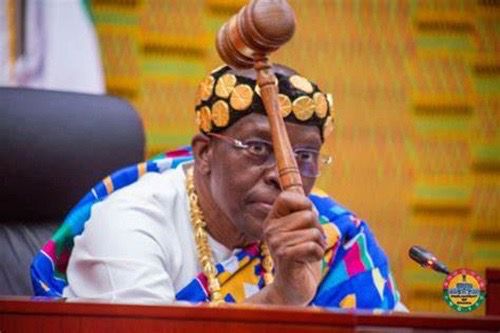The Minority in Parliament has formally challenged the recent suspension of four Members of Parliament (MPs), arguing that Speaker Alban Bagbin’s decision violated established parliamentary procedures and constitutional rights. In a memorandum addressed to the Speaker, the Minority Leader, Alexander Afenyo-Markin, detailed the procedural and constitutional flaws that underpin their objection to the suspensions of MPs Alhassan Sulemana Tampuli, Frank Annoh-Dompreh, Jerry Ahmed Shaib, and Rockson-Nelson Dafeamekpor. The core of the Minority’s argument rests on the assertion that the Speaker’s actions circumvented the established parliamentary procedures outlined in the Standing Orders.
The Minority’s primary concern revolves around the Speaker’s unilateral decision to suspend the MPs. According to the Standing Orders, disciplinary matters should be referred to the Committee of Privileges and Immunities for investigation and recommendation. The Minority contends that this crucial step was bypassed, thereby denying the affected MPs the opportunity to present their case and defend themselves against the allegations. This, they argue, represents a significant breach of parliamentary procedure, rendering the suspensions procedurally flawed. The memorandum emphasizes that the Speaker’s direct intervention, without the involvement of the relevant committee, undermines the integrity of the established disciplinary process.
Furthermore, the Minority raised constitutional concerns, referencing Articles 19 and 23 of the 1992 Constitution. Article 19 guarantees the right to a fair hearing, a fundamental principle of natural justice. Article 23 obligates administrative bodies, including Parliament, to act fairly and reasonably in the exercise of their powers. The Minority argues that by summarily suspending the MPs without a formal investigation or the opportunity for a defense, the Speaker violated these constitutional provisions. The lack of due process, they contend, infringed upon the MPs’ fundamental rights and undermines the principles of fairness and justice.
The Minority also challenges the Speaker’s jurisdiction in this matter, arguing that the alleged misconduct occurred within the proceedings of the Appointments Committee. They assert that, according to parliamentary practice, any disciplinary action related to committee proceedings should originate within the committee itself, presided over by the committee’s chair. Therefore, the Speaker’s direct intervention in this matter, bypassing the Appointments Committee, is seen as an overreach of authority and a violation of the established division of responsibilities within Parliament. This procedural irregularity further strengthens the Minority’s argument against the validity of the suspensions.
In light of these perceived procedural and constitutional breaches, the Minority has formally requested the Speaker to reconsider the suspension ruling. Their memorandum calls for a comprehensive review of the decision, urging the Speaker to ensure that all disciplinary actions taken by Parliament adhere strictly to the established procedures and constitutional safeguards. This request emphasizes the Minority’s commitment to upholding the principles of due process, fairness, and the rule of law within the parliamentary framework. They seek to ensure that future disciplinary actions are conducted in a manner that respects the rights of all MPs and maintains the integrity of Parliament’s internal processes.
The Minority’s challenge to the Speaker’s decision highlights the importance of adhering to established parliamentary procedures and upholding constitutional rights. Their detailed memorandum serves as a formal record of their objections, outlining the specific procedural and constitutional grounds for their challenge. The outcome of this matter will have significant implications for the functioning of Parliament, particularly concerning disciplinary procedures and the protection of MPs’ rights. The Speaker’s response to the Minority’s concerns will be crucial in determining the future course of action and ensuring that parliamentary procedures are conducted in accordance with the principles of fairness, transparency, and respect for the rule of law.


